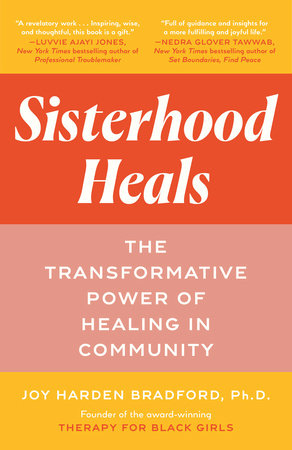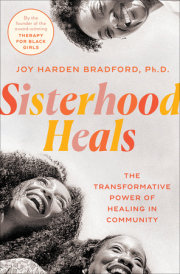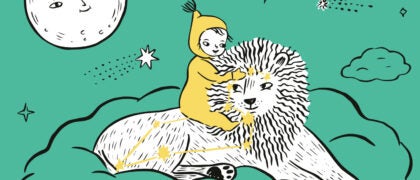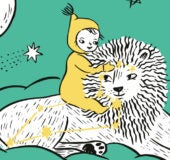Chapter 1 What Shapes Our Connections We are each other’s
harvest;
we are each other’s
business;
we are each other’s
magnitude and bond.
—Gwendolyn Brooks
My grandparents’ home sits at what I would describe as the apex of the little town of Napoleonville, Louisiana. It is directly across the street from a Baptist church, up the street from the elementary school, around the corner from the house where you could buy the best homemade pies, and on the route to the only grocery store there was in town until it closed after Hurricane Katrina. In short, it is a great place to have a front row seat to all the action, and the best seats were always on the front porch, where the women in my family “held court.”
Like the ear-hustling kindergartner I was, the porch was also where I wanted to be. It’s where the women in my family would gather, whether they were eating frozen cups or doing hair. It’s where my Tee Jane would talk about whose kids were acting up at school and my Tee Cynt would talk about the latest employment drama at Bill’s Dollar Store. It’s where my Tee Ivy would get caught up on all the latest town gossip since she now lived in Texas and was usually only home for the summer and Christmas. Tee Lisa would take a sip of Dr Pepper—mostly for dramatic effect—before filling us, I mean them, in on what she’d heard while getting her hair done.
“Y’all heard Reverend Arnold’s sons was down there fighting at Blue Monday?” Tee Lisa would ask.
“Fighting! What were they fighting for?” Tee Cynt wondered aloud.
“Apparently that youngest one, Darryl, found Cedric Wilson’s car in the driveway when he came back from offshore, and you know that didn’t go over too well.”
“Oh no! Didn’t his wife just have that baby a few months ago?”
Hiding behind the door or hovering unseen somewhere nearby, with the tiny hairs on my five-year-old arms standing at attention, I’d peep around the corner to listen as she expertly weaved the harrowing tale of what happened when Darryl came back home to find Cedric alone with his wife. “Girl, yeah. They said he took off on foot running straight down Highway 308. He lucky he didn’t get hit.”
“I know them neighbors was outside cutting up.”
“You know they were!”
The cackles and laughter as she relayed Cedric’s attempts to run out of the house unscathed did something to my little body that I wouldn’t be able to define for decades. Though I didn’t always understand what they were talking about or what was going on when my aunts and grandmother would have these porch talks, I knew it was something special. There were always laughs, always somebody talking loudly, or whispering if the occasion called for it. All I knew was that this dynamic, this back-and-forth way of being, of engaging, was everything. It was where I first learned the healing power of sisterhood. It’s also the first place I learned how to navigate conflict. It was the sharing between these women in my life that provided a foundation for what I understood sisterhood to be.
Over the course of our lives, we build the foundations of our connections on inherited ideas about what it means to be in relationship with one another, how to deal with differences between ourselves and others, and who is deemed worthy of such connection. Those earliest ideas about connection, community, and sisterhood as well as
how we attach ourselves to one another are often formed in our youth. They evolve from our very first relationships, with our parents or caregivers, siblings, and family members. In order to truly unpack, heal, and grow our friendships and ourselves we must start at our origin stories.
Some of the most formidable conversations I have with my clients stem from the information they share about their early relationships. I often spend time asking them questions and listening to their responses: Who was your biggest supporter growing up? How would you describe your relationship with your parents? How would you describe your relationships with your siblings? What did your friendships look like as a child? What I’m listening for are patterns in relationship dynamics from childhood that might be impacting current relationships. For example, a response like “No one really supported me growing up” or “I made friends pretty easily but none of the friendships seemed to last” would likely prompt a conversation about what support looks like today and whether longevity in friendships continues to be difficult. By no means does our childhood write our future in stone, but it can provide some helpful clues.
Because of the salience of women’s friendships in our lives, it is important for me to assess this as a part of my work. Our friendships, our sister circles, have been proven to extend the years of our lives. This isn’t hyperbole, Sis. It’s true! In fact, Dr. Robin Dunbar, an anthropologist and evolutionary psychologist, states that “friendship is the single most important factor influencing our health, well-being, and happiness.”1 There’s no way around it—we need one another. We need our sisters. Psychologist Julianne Holt-Lunstad and her colleagues found that being isolated was as bad for our health as smoking fifteen cigarettes per day. And Harvard Medical School agrees. Its 2010 study showed that “a relative lack of social ties is associated with depression and later-life cognitive decline, as well as with increased mortality.”
In addition to all the studies about how affirming friendships and connections are to improved physical health and longer life expectancy, it’s also true that relationships with our sisters can contribute to greater self-esteem and stronger mental health. Healthy friendships make us feel less lonely, and that has a huge overall impact. Much has also been written and shared about the staggering impact that loneliness can have on our lives. In 2019, the Cigna U.S. Loneliness Index reported that 61 percent of Americans shared feeling lonely. That same year, a study of two thousand Americans, commissioned by Evite, found that the average American hadn’t made a new friend in the past five years. Loneliness has been linked to elevated risk of heart disease, higher blood pressure, and increased rates of depression and anxiety.
Forming strong connections with others—physical, mental, and emotional bonds that can withstand time and change—is not only valuable in many areas of our lives but also integral to our development as humans and connected to our very survival. For Black women, this is especially true. It is why I believe that the best way for Black women to thrive is through our healthy relationships with other Black women. As Nikki Giovanni once said, “Black women are . . . the only group that derives its identity from itself. I think it’s been rather unconscious but we measure ourselves by ourselves, and I think that’s a practice we can ill afford to lose.” Yes ma’am, Ms. Giovanni. I couldn’t agree more. I measured so much of myself by those women I loved on the porch. But I’m also clear that keeping close ties and maintaining flourishing relationships as an adult is not always so easy. The hurdles tend to have deeper roots.
Messages from Mama
“What did Sheena say to you yesterday?” my mama would say. Or, her favorite question was “Do you think she’s jealous of you?” From the time I started high school until now, my mother has always been intrusive in my relationships with other girls and women. She wants to know everything—I mean, every single detail. She’s always cautioning me to be wary of my friends because she believes that women, in general, are not trustworthy. In her words, “They will turn on you in a minute.” I don’t necessarily believe that, but I have to admit that her questions often left me confused. I gravitated to having more friendships with guys because it just didn’t create the kind of friction with Mom as the relationships with girlfriends did.
—Tamara, 35
Copyright © 2023 by Joy Harden Bradford, PhD. All rights reserved. No part of this excerpt may be reproduced or reprinted without permission in writing from the publisher.








